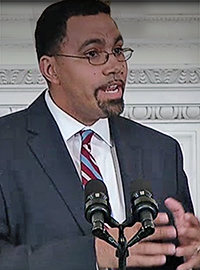| The U.S. Department of Education: In the Middle of a Maelstrom |
 |
|
By Ben Boychuk
Wednesday, October 14 2015 |
Congratulations to John B. King, President Obama’s pick to replace Arne Duncan at the helm of the U.S. Department of Education. The former New York State schools chief can look forward to spending the next year overseeing a bureaucracy that shouldn’t exist, beset by hostile teachers’ unions on his left flank and hostile congressional Republicans on his right. No pressure. Duncan announced last month he planned to leave his post at the end of the year to spend more time with his family in Chicago. The news came as a surprise to many. Duncan has been with the president from the beginning. He was the face of the administration’s efforts to expand the federal government’s reach into the nation’s classrooms through such measures as Race to the Top and the Common Core standards. He also oversaw an Office of Civil Rights that has used the hammer of Title IX to force colleges to adopt draconian policies against an alleged epidemic of sexual assaults on campus. Duncan was never popular with the teachers' unions, who resented him for pushing accountability measures that tie student performance to teacher compensation and tenure. He waved off the occasional calls for his resignation from the National Education Association and the American Federation of Teachers, and Obama seemed to have his back. But Duncan couldn’t wave off Congress so easily. House Republicans, who have quite rightly opposed the administration’s expansionist education policies, were poised to pass legislation that would have placed restrictions on the secretary’s power to approve contracts and make other unilateral decisions. Although the bill was clearly aimed at constraining Duncan, it has merit no matter who sits behind the secretary’s desk. When word of Duncan’s resignation was followed almost immediately by the announcement of King as his replacement, the unions wasted no time making their disapproval known. One New York-based group of activists calling itself the “Badass Teachers Association” lambasted him for “dismantling public education by using corporate education reform tactics.” Clearly, there will be no honeymoon for King. Before he arrived as a special adviser earlier this year from the New York State Education Commissioner’s office, King was a co-founder of Roxbury Prep, a top-ranked charter school in Massachusetts, later working at Uncommon Schools, a charter network with schools in Massachusetts, New York and New Jersey. That fact alone made him susceptible to union charges that he is a “deformer” in bed with “the billionaire boys club” bent on “privatizing” education. (Unions always elide the fact that charter schools are public schools.) King’s agenda as commissioner had the unions baying for his blood. Like Duncan, King supports teacher accountability measures. He doesn’t buy the union argument that poverty and crime alone explain why urban schools founder so frequently. “Yes, we should have better health care and housing and criminal justice reform,” King told Politico earlier this month. “But school can save kids’ lives. It saved mine.” King also drew fire from New York Republicans for his zealous implementation of the Common Core. But partisan conflict over education policy is nothing new. What’s interesting here is the ever-widening gap among Democrats over school reform. It’s not as though they differ very much on first principles. Very few Democrats support school vouchers. Practically all of them fret about equity and favor greater funding and higher teacher pay. And there is broad agreement among Democrats that America’s schools should have national standards and a national curriculum of some kind. So the disagreements really boil down to tactics. Put simply, Reform Democrats would tie higher teacher pay to improved student performance. Union Democrats would simply raise teacher pay. Reform Democrats would give parents some narrowly circumscribed choices in where they send their kids to school — a traditional public school in a neighboring district, say, or a charter school. Union Democrats believe school choice — even public school choice — deprives neighborhood schools of resources (read: funding). Both camps base their appeals on equality, not liberty. Union Democrats insist that public schools are the great social equalizer and that nothing ails the schools that more tax dollars couldn’t fix. Reform Democrats look at low-income and minority parents at failing city schools and say they shouldn’t be trapped — they deserve better. The answer, of course, isn’t more money or more federal rules requiring states and local schools to comply with this or that accountability scheme. The answer is choice — which is a much greater equalizer. Arne Duncan and John King may be the bane of teachers' unions, but neither camp understands that one essential truth. |
Related Articles : |
























